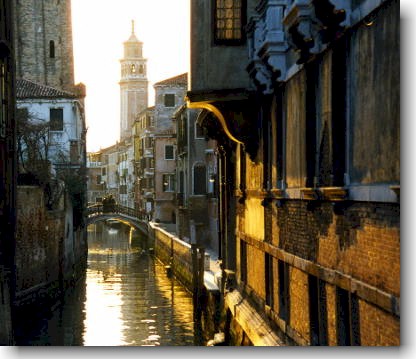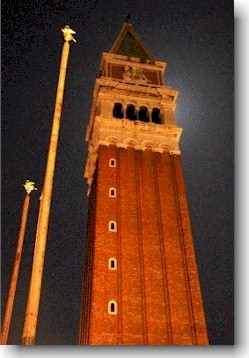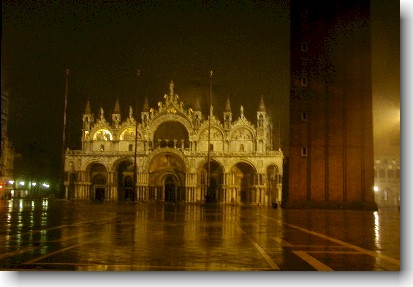|


| |
| |
The Bells of
Venice
|
| |
One of the great joys of Venice is the never
ending bells chiming from the hundreds of campanili (bell
towers). The bells are rung at various times of the day, but at
6:00 p.m. there is a symphony of ringing that can be heard from near and
far no matter where you are in Venice. Each campanile has its
distinctive sound. Some are tinny. Some are striking. Some are eloquent.
|
| |

This is Rio San Barnaba with the campanile of Santa
Maria del Carmelo,
known as I Carmini. Click the picture to hear a brief clip
of the 6:00 p.m. bells.
|
| |
The
Marangona
There is one very special bell in Venice and it
has a name. It is the Marangona. It is located in the great
campanile in Piazza San Marco and is the only one of the five original
bells to survive the collapse of the tower on July 14, 1902. It is an
ancient bell or unknown origin and it has the most beautiful, haunting,
and mellifluous tone of any bell we have ever heard.

|
|
Click on the campanile
to hear a clip of the Marangona at midnight. |
The campanile of San Marco was originally built in
the 9th Century as a watch tower for the harbor and was later rebuilt to
its present look by Bartolomeo Bon in 1514.
Bon was one of the most important sculptures and architects of Gothic
Venice who gave us the
glorious
façade of Ca' d'Oro.
Each of the
original five bells had names and were rung to signal a specific events:
the Maleficio signaled that a capital execution was going
to take place. La Trottiera called
magistrates to the Palazzo Ducale; La Nona rang
at the ninth hour; The Pregadi
announced meetings of the Senate. The
Marangona rang the beginning and ending of the work day and was
named after the marangoni, the carpenters, but the term was
synonymous for workers. In
1912 the campanile was rebuilt exactly as it looked before it collapsed.
If fact, they used as much of the original material as they could. So,
many of the bricks date to the beginning sixteenth century. |
| |
Today the Marangona
is only rung twice a day, at noon and midnight. To hear it in its
glory, you must go at midnight when the piazza will be quiet and the
Marangona is struck solo. At
midday, the bell competes with all the tourists who do not even hear it.
Go and sit at the
Caffè
Chioggia which is open late and plays nice
jazz. Just before midnight, take your drink and go stand in the middle
of Piazza San Marco and listen to
the Marangona as you gaze on the haunting church looming like a mirage. You
will remember it forever.

Piazza San Marco starting to flood at Midnight. |
|